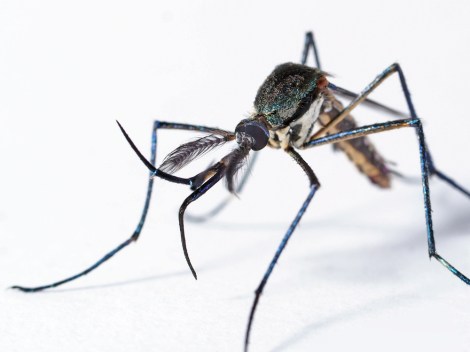Mosquitoes are, at best, horrible annoyances. At worst? They are genocidal maniacs, responsible for more than half a million deaths a year, transmitting malaria and other diseases. Were causing extinction subject to popular vote, mosquitoes would win in a landslide.
All of that, relative to the moment, is the good news. Now, the bad.
Mosquitoes laugh at your so-called repellant.
Well, they don’t laugh, as such, lacking the capacity for forced expulsion of air from their probosci and, likewise, any sense of humor. Point is, the most common chemical used to repel the little idiots is losing its effectiveness. From Smithsonian.com:
A group of researchers from the London School of Hygiene and Tropical Medicine discovered that three hours after an exposure to DEET, many Aedes aegypti mosquitoes were immune to the chemical, ignoring its typically noxious smell and attempting to land on irresistible human skin. …
So why did the mosquitoes, as a whole, overcome their dislike of DEET? Previous studies by this group and others have found particular mosquitoes with a genetic mutation that made them innately immune to DEET, but they say that this case is different, because they didn’t demonstrate this ability from the start.
They suspect, instead, that the insects’ antennae became less chemically sensitive to DEET over time, as evidenced by electroantennography on the mosquitoes’ odor receptors after each of the tests — a phenomenon not unlike a person getting used to the smell of, say, the ocean or a manufacturing plant near his or her house.
In other words, all picnics should now be scheduled for two hours, 55 minutes in length.
That point about genetic mutation is an interesting one, worth pulling out. After all, one strategy used in Key West last year called for releasing genetically modified mosquitoes that would deplete the region’s supply of blood-suckers by greatly decreasing the bugs’ lifespans. The proposal prompted some concern, quite understandably: Regular mosquitoes are bad enough. But mutants?
It’s not clear what the repercussions of mutated mosquitoes might be.
In a very good, thoughtful article that will appear in this Sunday’s New York Times Magazine, Maggie Koerth-Baker looks at the unintended consequences of tweaking skeeters. After noting how mosquitoes are adapting to mosquito nets (feeding more often during the day), Koerth-Baker considers the consequences of proposed plans to modify the insects or the malaria virus to reduce the damage each can do.
[A]ll solutions, whether as simple as a net or as complicated as splicing genes, come with risks. For instance, Aedes aegypti is the species primarily responsible for spreading dengue. It’s present around the world, but outside North Africa, it’s an invasive species. If scientists use flightless female modifications against A. aegypti and succeed in decreasing its presence in, say, Mexico City, then what will fill its ecological niche there? (What is its ecological niche anyway? One entomologist told me that we don’t even have a great understanding of mosquitoes’ place in our ecosystem, because we have focused our efforts on killing them rather than observing them.)
Even curing a disease poses risks, because in all likelihood it won’t stay cured forever. If G.M. mosquitoes completely neutered the malaria parasite’s threat, even in one part of the world, it would be an incredible success story. But what happens if the parasite adapts to circumvent the tools we’ve used to fight it? Today we know how to take precautions to prevent malaria transmissions and fight the disease with antimalarial drugs. But in the future, some version of malaria could surge through a population of humans without the cultural knowledge or pharmaceuticals necessary to defend themselves against it.
So, to summarize: Using repellant deters mosquitoes for a few hours. Genetically modifying them bears unknown risks. Oh, and as the world gets warmer, the insects’ range and seasons of activity expand, as we saw last year in Alaska.
But don’t worry. It’s winter. It will be weeks before mosquitoes are hovering over stagnant pools of water, attuned to your exhaled breath and ready to suck your blood. Make the most of it.




